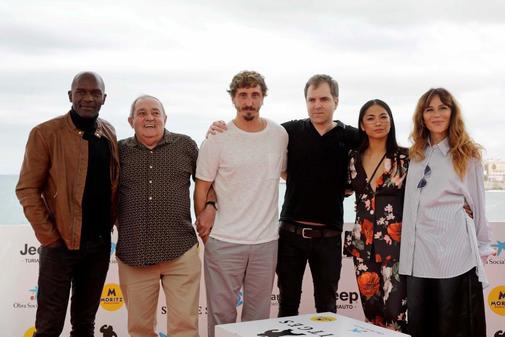Writing about a record of a festival always raises the same question: How can it be of the least interest to the reader if he has not seen any of the films in competition? In fact, it is in the nature of the tapes, since they have not been released, to remain hidden. However, 'El hoyo', by Galder Gaztelu-Urrutia, has seen it. In fact, we have seen it all. Although many do not even know it. And that is so because, and in the same way as in the others, in yes it is in its nature and its argument to have seen. And not once, but every day, at all hours and in all corners of the planet. And that, in effect, is its virtue. And his sentence.
The film, which was not only designated as the best but also appeared in the box of best special effects, tells the almost routine becoming of a group of people arranged vertically. Above, the most fortunate; below, the least . Daily, a food platform routinely descends from the top to the bottom of the whole. Everyone can use whatever they want, which may be what they need or simply what they want. If everyone promised to eat exclusively what was necessary to nourish for the sake of a healthy life, there would be for everyone, but ... they have guessed it: that is war. That is, that is the world. And below, nothing comes. But nothing.
Have you seen the movie or not?
The jury wanted to do justice on the most straight path: the obvious one, the one who recognizes that the obvious is sometimes the best . Gaztelu-Urrutia returns science fiction to its natural terrain: that of parody that is also a metaphor; to metonymy that is critical at the same time. But very acid and very wisely managed. The film moves with ease between satire and detailed portrait. It is political with the same clarity as fairy tale. Sinister for perfectly plausible. And real, insultingly real.
'The hole' entertains itself in drawing just a few plots that never want to be simply anecdote. When he imagines the possibility of a revolution, from his hand the need (or almost) of a terror regime will appear. Everyone is charitable ... with what is left over . Compassion, it hurts to recognize it, is a luxury for very well fed people. And so.
What emerges in this way is a wise, sad and revealing film that recalls Mercero's 'The Cabin' with the same clarity that the classic postulates of both Orwell and Huxley do, between '1984' and 'A happy world'. And it does so while proposing a provocatively hyperreal aesthetic determined to match the futuristic fable with the dirt; the costumbrismo with the futurism; figurative art with the dirtiest abstraction.
Undoubtedly, the result is a new path in the fantastic Spanish as close to 'Cube', by Vincenzo Natali, as to 'La gran comilona', by Marco Ferreri. Sitges rewards thus what already surprised by its clairvoyance in Toronto . And what will come.
For the rest, the best direction was for 'Bacurau', the Brazilian film that already surprised in Cannes. Much more radical, if possible, and even surprising is 'Bacurau'. The director of 'Sounds of the neighborhood' and 'Doña Clara', two productions so thoughtful, precise and furiously political, allies with Juliano Dornelles (producer rather than producer) to make an unexpected action movie. Half magic, the other half brutal. History shares with the B series its absolute lack of prejudice, its accidental rigor, its exaggerated sincerity, its faith in the total lack of faith. A group of idle Americans arrive in a lost town of the Brazilian Sertao with the intention of enjoying a day of hunting. Taking into account the lack of hunting resources in the area, the targets are simply those that live there. The logic is simple and indisputable: some shoot and others die. More or less as always and, again, just as evident as 'The hole'. Yes, this tape has also been seen.
For the rest, the Special Prize, in addition to the best photography, went to 'Adoration', by the Belgian Fabrice du Welz, an unstoppable teenage adventure that, yes, they may not have seen.
Be that as it may, 'The hole', a film that must be seen, despite having seen it.
Medal winners of the official section
Best film : 'El hoyo', by Galder Gaztelu-Urrutia.
Best director : Klener Mendonça Filho and Juliano Dornelles, for 'Bacurau'.Special Award : 'Adoration', by Fabrice du Welz.
Best actress : Imogen Poots, for 'Vivarum', by Lorcan Finnegan.
Best actor : Miles Robbins, for 'Daniel isn't real', by Adam Egypt Mortimer.
Best Screenplay : Mirrah Foulkes, for 'Judy & Punch', by Mirrah Foulkes.
Best special effects : Iñaki Madariaga, for 'The hole'.
Best photograph : Manu Dacosse, by Adoration, by Fabrice du Welz.
Best music : Dan Levy, for 'J'ai perdu mon corps, by Jérémy Caplin.
According to the criteria of The Trust Project
Know more- movie theater
San Sebastian Festival Antonio Resines: "Against Amenábar are the same as against Trueba"
70 years old The boy in the painting (of Pain and Glory) that is Almodóvar
Cinema 'The daughter of a thief', the first opera of the year in which Greta Fernández killed her father

